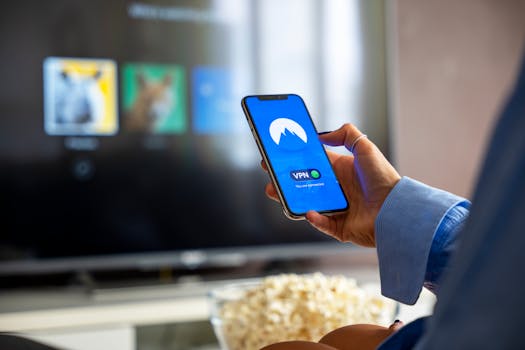
VPNs are often touted as the ultimate solution for online anonymity, but is it really that simple? Let's dive into the truth behind VPNs and explore their capabilities and limitations when it comes to protecting your privacy in the digital world.
VPNs: Your Key to Online Anonymity? The Truth Revealed
VPNs are often touted as the ultimate solution for online anonymity, but is it really that simple? Let's dive into the truth behind VPNs and explore their capabilities and limitations when it comes to protecting your privacy in the digital world.
Introduction
In today's interconnected world, online privacy is more important than ever. We leave a digital footprint with every click, search, and interaction. A Virtual Private Network (VPN) is a tool designed to encrypt your internet traffic and mask your IP address, making it seem like you're browsing from a different location. This can significantly enhance your online privacy, but it's crucial to understand that a VPN is not a magic bullet for complete anonymity.
How VPNs Enhance Privacy
A VPN works by creating an encrypted tunnel between your device and a VPN server. This tunnel protects your data from prying eyes, such as your internet service provider (ISP), public Wi-Fi hotspots, and even government surveillance. Here’s how it enhances privacy:
Masking Your IP Address
Your IP address is a unique identifier that can be used to track your online activity. A VPN replaces your real IP address with the IP address of the VPN server, effectively hiding your location and making it more difficult to identify you.
Example: Imagine you're accessing a website from New York. Without a VPN, the website sees your New York IP address. With a VPN connected to a server in London, the website sees a London IP address instead.
Encrypting Your Data
VPNs encrypt your internet traffic, making it unreadable to anyone who might be intercepting it. This is especially important when using public Wi-Fi networks, which are often unsecured and vulnerable to hacking.
Tip: Always use a VPN when connecting to public Wi-Fi at coffee shops, airports, or hotels. This will protect your sensitive information, such as passwords and credit card details.
Bypassing Geo-Restrictions
Many websites and streaming services restrict access to content based on your location. A VPN allows you to bypass these restrictions by connecting to a server in a different country.
Example: If you're traveling abroad and want to access your favorite streaming service, you can connect to a VPN server in your home country to unblock the content.
Limitations of VPNs for Anonymity
While VPNs offer significant privacy benefits, they are not foolproof. Here are some limitations to consider:
VPN Logging Policies
Not all VPNs are created equal. Some VPN providers log your browsing activity, which defeats the purpose of using a VPN in the first place. It's crucial to choose a VPN with a strict no-logs policy.
Tip: Read the VPN provider's privacy policy carefully before signing up. Look for a VPN that explicitly states that it does not log your browsing activity, connection times, or IP addresses.
DNS Leaks
A DNS (Domain Name System) leak occurs when your DNS requests are not routed through the VPN server, revealing your actual IP address to your ISP. This can happen if your operating system or browser is not properly configured.
Tip: Use a VPN that offers DNS leak protection. You can also test your VPN for DNS leaks using online tools.
WebRTC Leaks
WebRTC (Web Real-Time Communication) is a technology that allows browsers to communicate directly with each other for video and audio calls. It can also reveal your real IP address, even when using a VPN.
Tip: Disable WebRTC in your browser settings or use a browser extension to prevent WebRTC leaks.
Browser Fingerprinting
Browser fingerprinting is a technique used by websites to identify and track users based on their browser settings, such as operating system, browser version, installed fonts, and plugins. A VPN cannot prevent browser fingerprinting.
Tip: Use a privacy-focused browser like Tor or Brave, which are designed to minimize browser fingerprinting.
Government Surveillance
While VPNs can protect your data from most threats, they may not be effective against sophisticated government surveillance. Governments have the resources to track and deanonymize VPN users if they are determined enough.
Achieving a Higher Level of Anonymity
To achieve a higher level of anonymity online, you can combine a VPN with other privacy-enhancing tools and practices:
- Tor Browser: Tor is a free and open-source browser that routes your internet traffic through a network of volunteer-operated servers, making it extremely difficult to trace your activity back to you. However, Tor can be slow and is not suitable for all types of online activity.
- Privacy-Focused Search Engines: Use search engines like DuckDuckGo or Startpage, which do not track your searches or personalize results based on your browsing history.
- Encrypted Email: Use an encrypted email provider like ProtonMail or Tutanota to protect your email communications from eavesdropping.
- Two-Factor Authentication (2FA): Enable 2FA on all your online accounts to add an extra layer of security.
- Strong Passwords: Use strong, unique passwords for each of your online accounts. A password manager can help you generate and store your passwords securely.
- Be Mindful of What You Share Online: Limit the amount of personal information you share online and be careful about what you post on social media.
Conclusion
VPNs are a valuable tool for enhancing online privacy, but they are not a silver bullet for complete anonymity. By understanding the capabilities and limitations of VPNs and combining them with other privacy-enhancing tools and practices, you can significantly improve your online privacy and protect yourself from prying eyes. Remember to choose a reputable VPN provider with a strict no-logs policy and take steps to prevent DNS and WebRTC leaks. Ultimately, achieving true online anonymity requires a multi-layered approach and a commitment to protecting your personal information.
